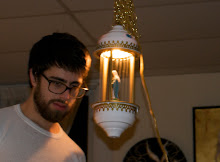Dear Church of the Holy Abstraction:
A quote:
It is possible that all architectures, everywhere, are tangent to one another. One leaves a building only to enter its neighbor. A continual entering and exiting. - "Eight Short Films About Architecture," G.C. Waldrep
By now, it is a common present-day Christian thing to say, "the church isn't a building; it's the people." Of course, they are right. Of course, they are wrong.
Obviously, the success of a community is based on those who commune, not the room in which they break bread and eat reduced fat Oreos. But, I can't forget about the architecture, because it is everywhere, and in fact, we are human architecture, cartilage spread over bone like a brick wall, skin sealing us off from the possible pain of air. We are buildings, and we are a stack of closed doors trying to open.
So, yes, there are home churches, and churches that meet in cinemas, attics, subways, mountaintops, anywhere, really, but still, we bring with us the fears that have been nailed to the beams and steeples of the churches we grow up in/around, despite the fact that the bucolic white church is still just a product of architectural vogue.
The philosopher Michel Foucault discusses Jeremy Bentham's idea of the panopticon--a structure (in his most common example, a prison) with a tower in the middle of a circle of high-rise chambers. In each chamber, the prisoner/occupant has no choice but to view the phallic tower, and has no way of knowing whether a prison official is inside watching her/him. This, as Foucault says, creates a non-violent means of control that encourages self-discipline.
The idea of something we can't see watching us. Not a stretch for you and me.
When I first studied the idea of the panopticon, I had thought that Foucault was criticizing Bentham's all-seeing eye, as it would surely make everyone crazy with the paranoia of who is/is not watching at any given moment. As I look back over it though, it seems he was suggesting it was a good idea, and that it could be used in schools and for mental patients--any mass of people that needs to be constantly controlled.
The architecture of power, then, is the architecture of fear. In "Eight Short Films...", Waldrep says there is no word for the fear of architecture.
The idea of God in the Panopticon isn't as scary as the thought of your leaders, pastors, reverends, elders, bishops, deacons, etc. camping inside the eyeball, watching us learn to be controlled. We cannot speak to you when you are behind the Pan-pulpit, and therefore your lessons become a power play. We are the unruly mob, and you are the one getting inside our head.
I want the architecture to change, and to expand, and I want you to get out of the panopticon and preach to an empty stage, so that you can know, like I do, a little bit about what it's like to talk to yourself. Then, we can experience the blessing of leaving this building together and visiting a neighbor's building, and another, and, hopefully, the visitation will never stop.
Waiting, Always,
a sleeper

